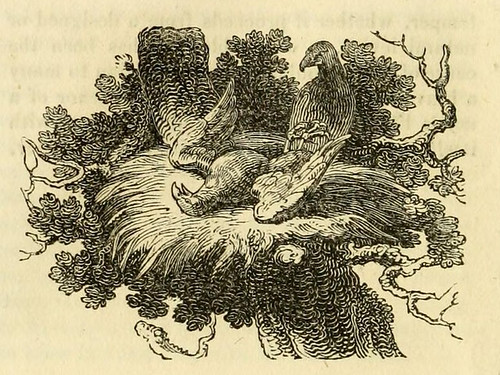Here is George Fyler Townsend's version (1867), and I've included some other English versions below, and you can check the Perry 324 label to see if there are any more.
A KITE, sick unto death, said to his mother: 'O Mother! do not mourn, but at once invoke the gods that my life may be prolonged.'
She replied, 'Alas! my son, which of the gods do you think will pity you? Is there one whom you have not outraged by filching from their very altars a part of the sacrifice offered up to them?'
We must make friends in prosperity if we would have their help in adversity.A typical illustration for the fable shows the ailing kite in his nest, with his mother by his side, as by Francis Barlow (1687):
~ ~ ~
A Kite, long sick and like to die,
Begg'd of his mother to apply
With offerings at a neighbouring fane,
And prayers that health he might regain.
I will, says she; though much I fear
Little can be expected there,
From Gods their shrines so oft who see
Defrauded and defil'd by thee.
~ ~ ~
Sir Roger L'Estrange (1692):
Pray Mother (says a sick Kite) give over these idle Lamentations, and let me rather have your Prayers. Alas! My Child (says the Dam) which of the Gods shall I go to, for a Wretch that has robb’d all their Altars?
THE MORAL Nothing but the Conscience of a virtuous Life can make Death easy to us; wherefore there’s no trusting to the Distraction of an agonizing and a Death-bed Repentance.
~ ~ ~
William Caxton (1484):
He that euer doth euylle ought not to suppose ne haue no trust that his prayer at his nede shalle be herd / Of the whiche thynge Esope sheweth to vs suche a fable / Of a mylan whiche was seke / so moche that he had no truste to recouere his helthe / And as he sawe hym so vexed with febleness / he prayed his moder that she shold praye vnto the goddes for hym / And his moder answerd to hym / My sone thow hast so gretely offendyd and blasphemyd the goddes that now they wol auenge them on the / For thow prayest not them by pyte ne by loue / but for dolour and drede /
For he whiche ledeth euylle lyf / and that in his euylle delynge is obstynate / ought not to haue hope to be delyuerd of his euyll / For whan one is fall in to extremyte of his sekenes / thenne is the tyme come that he must be payed of his werkes and dedes / For he that offendeth other in his prosperyte / whan he falleth in to aduersyte / he fyndeth no frendes /



No comments:
Post a Comment